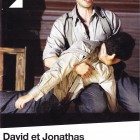David et Jonathas 2012Les Arts Florissants
Read more about the opera David et Jonathas
William Christie and his wonderful group of period specialists Les Arts Florissants made their reputations by producing superb revivals of largely unknown works of the French baroque, by Lully, Charpentier, Rameau and others.
Their Edinburgh Festival debut in 1985 included a memorable staging of Charpentier's Actéon, as well as Rameau's Anacréon. These were staged in a manner which essentially gave an idea of seventeenth century visual style. They returned in 2001 with Rameau's superb full-length Zoroastre, sadly only in concert form. That it has taken a decade more to produce a further exploration of Charpentier is rather disappointing - but better late than never, since this still little-known composer was clearly one of the early masters of opera. Christie first performed and recorded David et Jonathas in 1988, so this revival has been a long time coming.
The plot uses the same biblical source as Handel's oratorio Saul, with its combination of love, jealousy, witchcraft and war. Charpentier's 1688 sacred opera is a dramatic and moving reinterpretation of the Old Testament tragedy set on the eve of battle. Where the operas of the period generally contain a variety of musical styles, including plentiful dance interludes, this work has a far more austere palette, with a number of long, slow choruses. The arias, intensely beautiful, also tend to be slow, but they are moving, especially those for David and Jonathan in the last two acts.
The austerity of the work means that it takes a while for the tension to build. It has to be said that the bleakness of this staging - stripped pine tables in a stripped pine box set - while it matched the music, struggled to introduce visual variety, with characters and choruses wandering on and off, and the box set shrinking and expanding before our eyes. The mime performed during the overture was prosaic - Mum, Dad and two boys at the breakfast table. The lady doesn't appear again, but Dad is Saul, with son and adopted son clearly on good terms. As the act develops, Saul's jealousy becomes plain to see, and is really the only source of visual variety on offer.
The musical side of the performance, led by William Christie from a raised pit, was wonderful, with faultless singing. The first half was dominated by the electrifying performance by Neal Davies as Saul. Just before the interval the veteran Dominique Visse, the only survivor from Christie's 1988 cast, made a strong impression as the Witch of Endor. Jonathan has little to do in the early acts, but the sweet-toned soprano of Ana Quintans was beautifully moving in his aria before the battle and in the death scene. Overall, as it should be, the performance was dominated by the interpretation of David. Pascal Charbonneau is a real find, youthful-looking and a good actor. Most importantly, he has that wonderful, eerie-sounding, effortless high-tenor for which so much French baroque music was written.
Performance Cast
- David a shepherd
- Jonathas son of Saül
- Saül King of Israel
- Warrior
- First Prisoner
- Second Prisoner
- Third Prisoner
- Achis King of the Philistines
- Joabel a Philistine General
- First Shepherd
- Second Shepherd
- Third Shepherd
- Pythonisse the Witch of Endor
- Samuel's ghost
- Attendant to David
- Attendant to Jonathas
